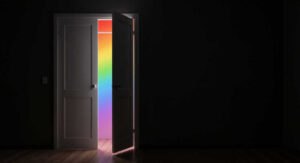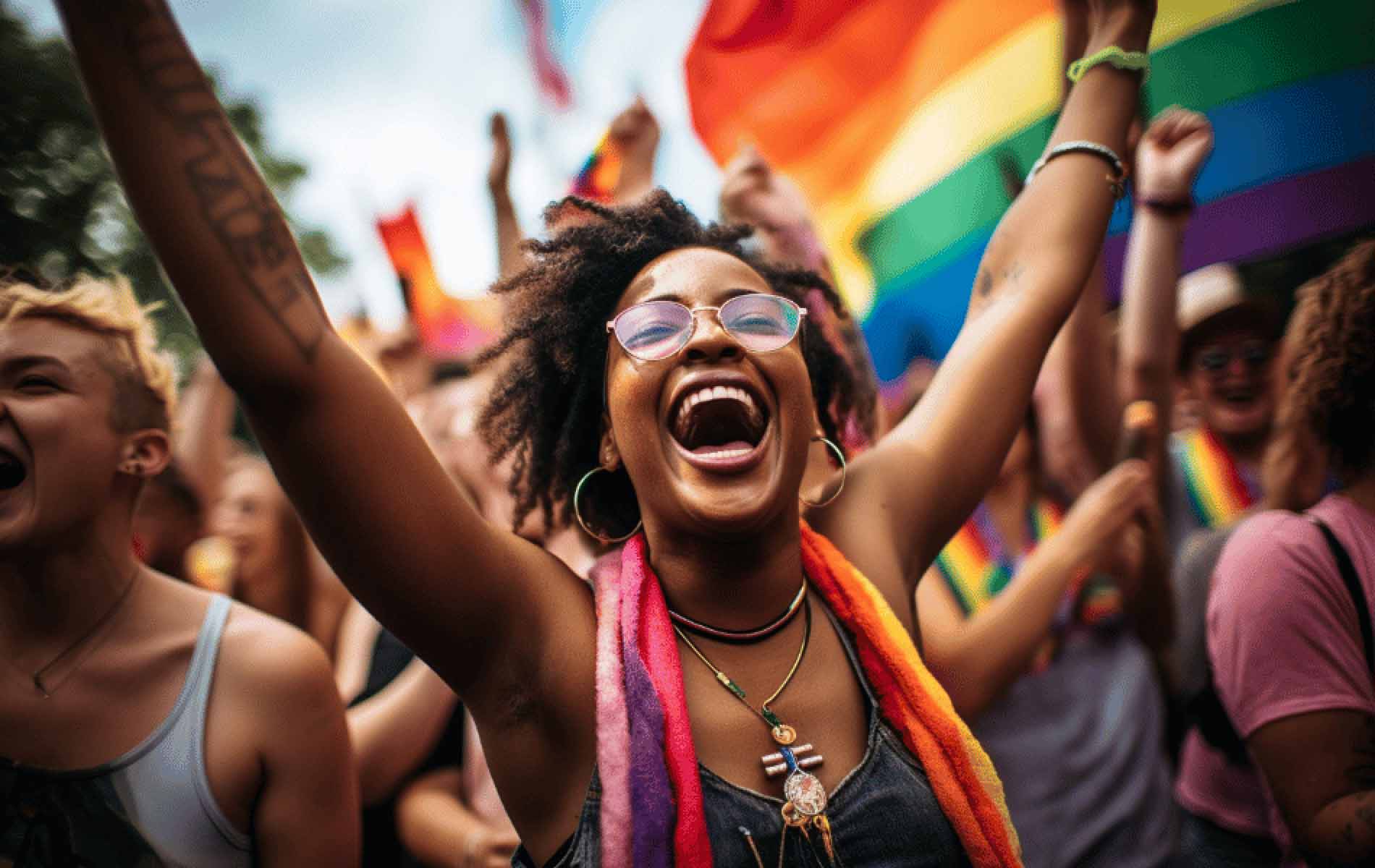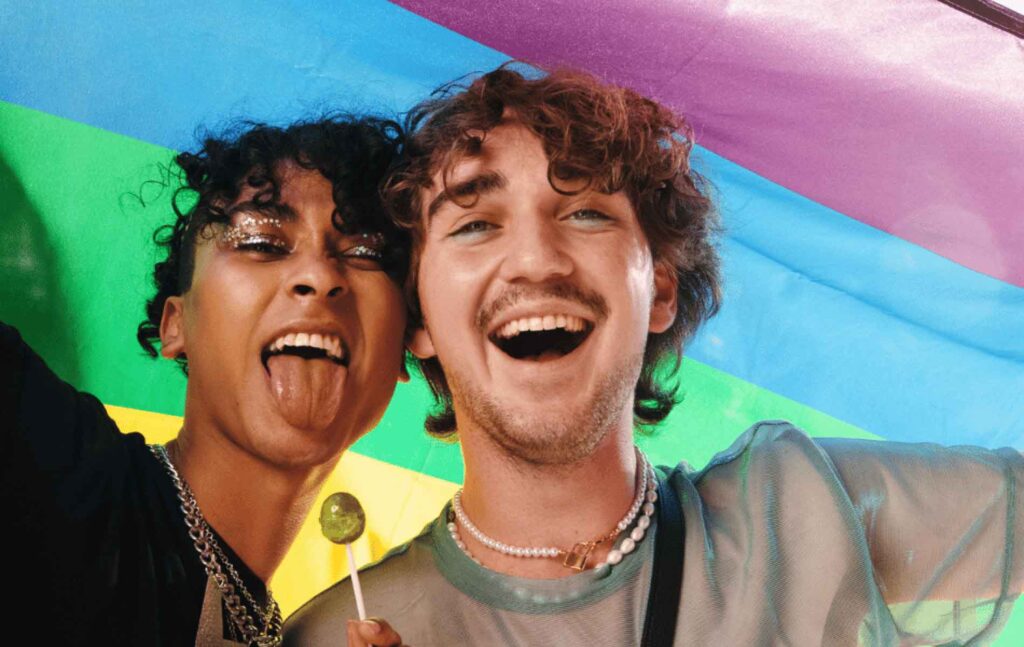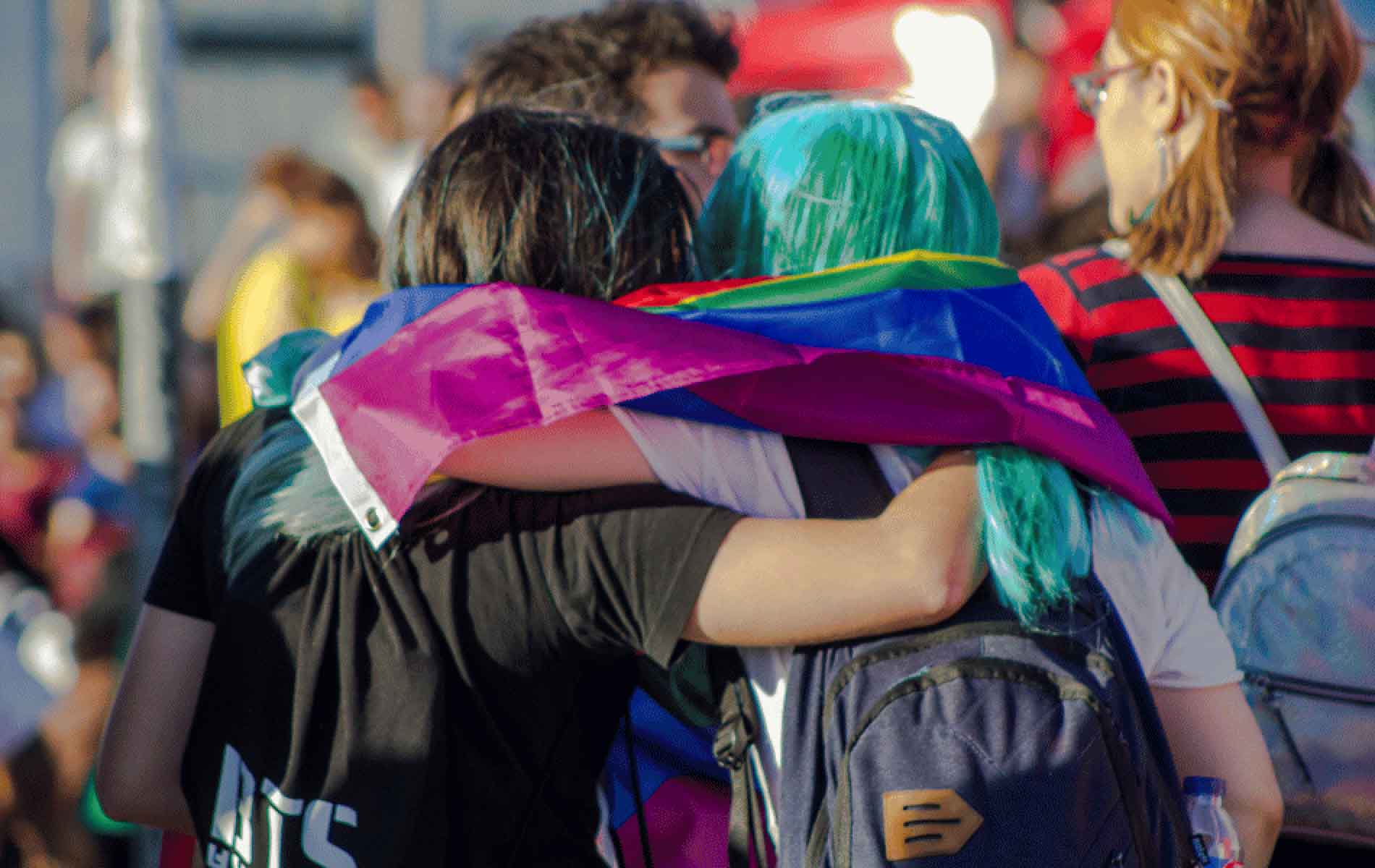
Pride and the power of curiosity
This Pride Month, mindhamok invites you to trade certainty for curiosity. Explore identity as a journey, embrace the power of compassionate questioning, and celebrate the courage to become — at your own pace

Author: Mabel Smith
defined by Miriam Webster Dictionary as “pleasure that comes from some relationship, association, achievement, or possession that is seen as a source of honour, respect, etc.” Here at mindhamok, we believe living our truth is something worth being proud of every day, not just in Pride month. We’ve got a lot of time for Pride.
At this time of year, we’re inundated with “love is love” and “love wins”. And, in theory, on paper, in an ideal world – Pride month and the LGBTQIA+ community should only ever be celebrated, but we know it’s not always that simple for everybody.
If we haven’t come out, if we haven’t been accepted by the ones we love for who we are, if we haven’t found our people yet. The world can be a lonely place. And feeling ashamed is quite the opposite of feeling proud.
In this blog, we aim to talk about the beauty and bravery in coming out and being queer. In the hopes that we will shine a light on the positives that come from being true to ourselves. And being proud of who we are. Because that’s what Pride is all about.
LGBTQIA+ is a term that collectively represents people who identify as Lesbian, Gay, Bisexual, Transgender, Queer (or those questioning their gender identity or sexual orientations), Intersex and Asexual.
The + represents the ever-growing community. As times change, so do words and meanings, and we’re all on the journey of learning together. This ‘+’ includes other sexual identities and people who aren’t questioning their sexuality but identify as a part of a group that might not be so well known or understood.
Coming out can be a scary experience. It puts us in a position of vulnerability, where it can feel as though we are welcoming the opinions (and perhaps criticisms) of others, on something that is very personal. Some people don’t feel a desire to come out, and the concept of having to come out might feel a bit icky, that’s ok. However, to some, coming out is a part of their identity and existence. In an ideal world being queer would be as accepted as being straight. We are yet to hear about stories where children sit their parents’ downs to tell them that they’re heterosexual or cisgender. Having to come out, in itself, is a disadvantage.
We have spoken to some of our nearest and dearest who have shared their experiences on coming out and what it looked like for them:
“Coming out, I was lucky. I think the only negatives I experienced was isolation. Because of coming out so young and not knowing other queer people. And school bullies etc. I was told I was gay by school bullies before I even knew I was. It was because of good parenting and family that I chose to fight and try and see the good. Also, for me, it was more than being gay. I am trans. And, later in my life, when I came out as non-binary – that was my real ‘coming out”
“The first time I came out was to my friend. It was a weird experience because I had never admitted it to even myself until that moment. She opened up to me about how she was struggling with her sexuality and that it made her feel ‘dirty’ – she had internalised a lot of homophobia. What she said really resonated with me – I had never heard of ‘internalised homophobia’ before but it described exactly how I had felt in the past. Her experience created a safe space that I felt I could be totally honest in. But at that moment, I wasn’t ready.
Only a month or so later did the conversation come up again with that same friend and another queer friend of ours. This time I knew that there was no going back and that I couldn’t carry on living in this denial – so I came out. We talked for hours. I thought it would be more liberating, especially as two of my best friends who were queer were by my side showing me so much love. Instead, I just hated myself. It was a moment of letting go of a life I didn’t even want, but a simpler one. Everything in that moment felt dirtier, I felt like a liar and pervert. I wanted more than anything, not to be gay but knew that deep down, living in denial would mean I was never truly happy.
It got better though, and slowly the hate turned into love. Once my closest friends knew I was gay I had a space to be completely true to myself. That secret I was hiding was out, but everyone was still here – nothing had changed, yet everything had changed. It’s a sad reality that not everyone will react in the way you had hoped and that those memories although softened with time may still be painful to reflect on, but I think that’s where ‘pride’ comes in to play. The circle of people that stay by your side and the new friends you make who have only met the authentic ‘you’ make you proud to be who you are, because it reminds you that you are enough, and you don’t have to live a lie anymore.”
“When I was 10, my sibling (who is non-binary so their pronouns are they/them) asked me “What would you do if I was gay?”. This is before they came out, so I now realise that they were testing the water. I remember saying something like “I would never speak to you again”. When I look back now – I couldn’t even tell you where that came from. I remember the word ‘gay’ being used as an offensive slur in school and public spaces. So, this mindset could have been picked up from anywhere. Luckily, my sibling is strong and didn’t take on what my 10-year-old-brain must have repeated from someone else.
I have grown up a lot since that moment. Growing up with a queer sibling has opened my eyes to so much. My sibling and I laugh at how ridiculous my response was back then and as much as I cringe at what I said, I know that I was just a child. I am so thankful I didn’t carry this mindset into my adulthood. I love my sibling so much. I am so proud of them. I couldn’t imagine a world where I don’t speak to them. I have learnt so much from them and their experience. I know that if I ever have children and they want to talk to me or come out, I will only show them love and acceptance.”

“As is quite common in the trans community, I had the joy of coming out twice! I am FTM (female-to-male) and back in my early teen years, trans wasn’t a word I had ever heard and even when I did in my later teens, it was only in relation to very stereotypical MTF (male-to-female) and cross dressers you would see in films/mass media.
I had relationships with women and played (in my mind) the role of the stereotypical American dreamy boyfriend found on teen TV series back in the 90’s (think The OC, One Tree Hill etc). I didn’t think much of it until my mum asked me if I had a girlfriend and this opened the conversation to being labelled as gay.
My parents couldn’t have been more supportive, and I later found out it was really no surprise to them. I’d refused to wear dresses since aged 4, had short hair since age 6, and changed my name at 11 so I guess the signs were there!
I found the gay community in Manchester and finally started to feel like I fit somewhere even though I was still uncertain around my own identity. Even at that time, I didn’t meet anyone (knowingly) who identified as FTM and there was little media representation too.
I recall finding the film Boys Don’t Cry both eye opening and really disturbing but would push the feelings away as it didn’t make sense. In my late twenties I was in a relationship that just wasn’t right, and then I finally realised that I’m not a lesbian, I’m trans.
All my close friends were like “well yeah” but when I called my mum over Skype as I was living abroad, she found it tough to take. We didn’t talk much over the next 12 months. After that we kind of moved past it by ignoring it.
Several years later I asked her why she didn’t say anything. She told me she was just so worried and sad for me that my life would be harder. I told her it couldn’t be any harder than living in a body that doesn’t resemble who I am.
Since then, I’ve learned to be patient with other people/society as it took me a long time to reach where I am. I became so good at repressing all my feelings around being trans that it’s only in my mid 30s that I’m starting to talk about it, and ‘action’ changes to my look and body.”
“Being queer to me means being magical. It’s a gift to see the world from this perspective. It’s made me more empathetic. And I think it teaches you courage and the importance of hope.”
“Being queer means having the freedom to be completely authentic to myself”
“It means being part of a chosen family and feeling part of something bigger.”
“Being queer to me means being free-er. Becoming a part of the LGBTQIA+ community opened a new world. Where no one needs to behave a certain way. Where people can cry and laugh when they want, be who they want and love who they want. To me, it’s a space to be free in. With your mind, heart, and body”
“Being queer to me means being part of a community where being yourself is always enough.”

To us, being queer means being here. It means existing, living, freely. Whatever that looks like. Sometimes that may be shouting, marching, fighting for a seat at the table. Sometimes being queer is having a cup of tea in front of the TV, snuggled into the person we love. Or when we can finally look at ourselves in the mirror and know that the person looking back is enough. It’s not having to weaponize our words anymore, because we’re safe, with friends who love and accept us. Being queer means passing on the lessons that we learn – so that when the next generation come out to their parents, they will be hugged and told that they can be, and love, whoever they want. Not shamed into secrecy and self-loathing. Being queer means letting go of shame – shame is a speed bump on the journey to happiness. We aren’t born with shame; shame is given to us by others. We must try to let go of shame and remember it’s not ours to carry. It’s a fact and a feeling at the same time. It’s hard to define what it means to be queer. All we can tell you is that being queer and supporting the LGBTQIA+ community is something to be very proud of. In the month of June and for the rest of time.
Although our experiences, definitions and identities may be different. The one thing Pride month and the LGBTQIA+ community continues to teach us, is that we are not alone, and that this resilient community is worth celebrating.
At mindhamok, we’ve got a lot of time for Pride and everybody, we celebrate everyones uniqueness, so put your mind in a hammock and stay with us.

This Pride Month, mindhamok invites you to trade certainty for curiosity. Explore identity as a journey, embrace the power of compassionate questioning, and celebrate the courage to become — at your own pace

When the world feels like it’s in constant crisis, staying focused on your studies and personal growth abroad can feel impossible – here’s how to help.
We do not use any tracking or advertising cookies on this site. We use functional and necessary cookies to make the site work. By continuing to use this website, you consent to their use in accordance with our Cookie Policy
Accept